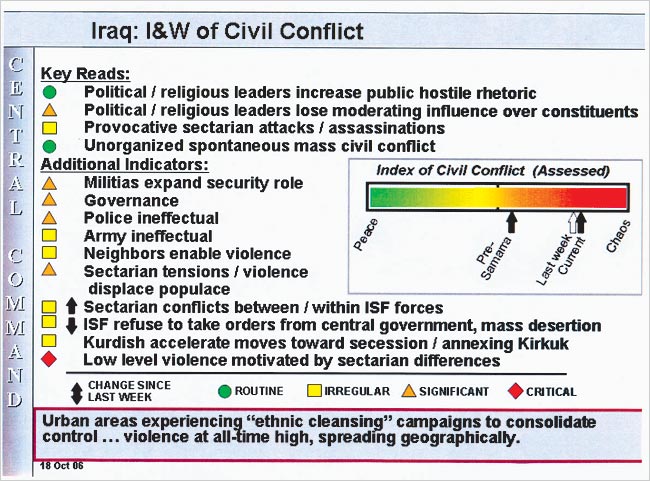The Situation in Iraq
The New York Times is running this picture, from a two week old classified military briefing.
The times article spends the majority of the piece describing the illustration in the United States Central Command briefing. I trust that my readers are capable of finding the color coded index and interpreting the 'key reads' and 'additional indicators' for themselves.
The briefing didn't contain any new information about the situation in Iraq. The 'news' contained in the briefing is that despite the rosy talk from Rumsfeld, the military has accepted that the situation in Iraq is deteriorating rapidly. One would assume that the White House will have to come around sooner or later. It also seems that the U.S. Military has come to the same conclusion about the bombing of the al-Askari shrine in Samarra - the tipping point that sent Iraq spiralling towards chaos.
In other Iraq news, the AP reports that the relationship between Iraq's government and the U.S. Military may be becoming strained:
U.S. demands for a crackdown on the militia have been a sticking point in relations with Iraqi Prime Minister Nouri al-Maliki, whose coalition government is heavily dependent on al-Sadr's political support.One can't fault al-Maliki, the Prime Minister of Iraq, for trying to increase the influence he has in deciding the future of his own country.
On Tuesday, U.S. forces dismantled road blocks around the Mahdi Army's Baghdad stronghold, the Sadr City neighborhood, following an order from the prime minister that was the latest in a series of challenges to the U.S. designed to test Washington's readiness to give him a greater say in securing the world's most violent capital.
Aides to the prime minister say he hopes to expand his authority by exploiting the pressure on President Bush over rising voter dissatisfaction with the conduct of the war and the rising U.S. death toll.
The Iraqi government has ordered U.S. troops out of one Baghdad neighborhood. At what point will it order U.S. troops out of the country all together? Perhaps that's George W. Bush's grand exit strategy. Fuck things up long enough, the Iraqis ask U.S. forces to leave and they go. I can see BushCo characterizing it as a grand exit from a newly liberated country...
Of course that would make it difficult for Republicans to blame Democrats for having to leave Iraq 'before the job was done.'
War in Iraq Classified Briefing Iraqi Civil War George W. Bush






No comments:
Post a Comment